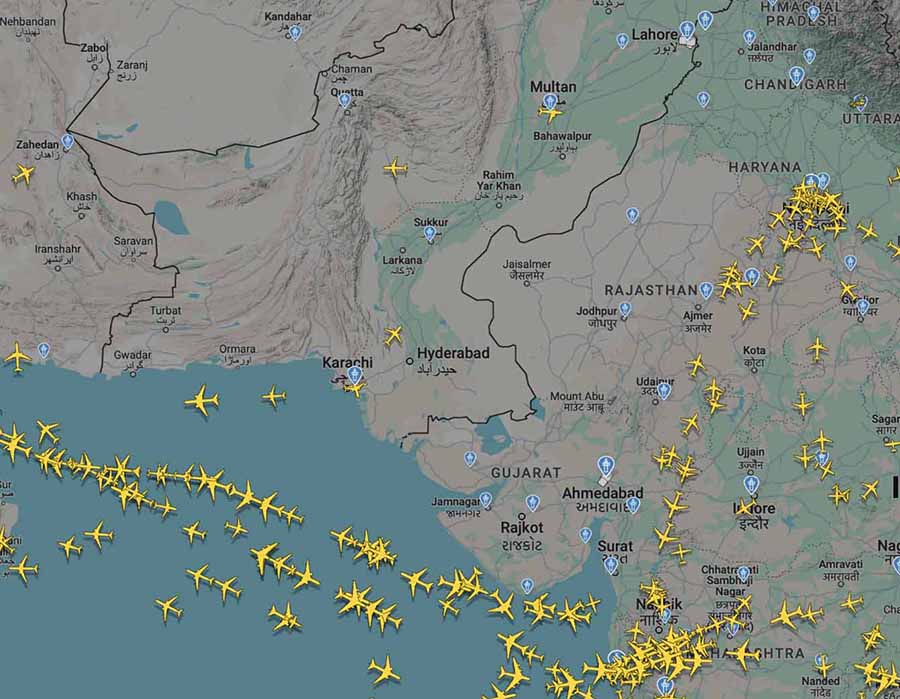
The escalation of conflict between India and Pakistan has led to significant disruptions in air travel.
All major Pakistani airports were reportedly shut for 48 hours. India closed 25 airports, primarily in northern and western regions, as a precautionary measure due to heightened security and military operations:
- Jammu and Kashmir: Jammu (IXJ), Srinagar (SXR), Leh (IXL), Pathankot (IXP)
- Punjab: Amritsar (ATQ), Chandigarh (IXC), Halwara, Bhatinda
- Himachal Pradesh: Dharamshala (DHM), Shimla (SLV), Kangra (DHM), Kullu-Manali (KUU)
- Rajasthan: Jodhpur (JDH), Bikaner (BKB), Jaisalmer
- Gujarat: Rajkot (RAJ), Jamnagar (JGA), Bhuj (BHJ), Kandla
- Delhi NCR: Hindon
- Uttarakhand: Pithoragarh (NNS)
- Other: Thois, Porbander, Kishangarh, Gwalior
The Indian Air Force took control of some airports, such as Shaheed Bhagat Singh International Airport in Chandigarh, suspending all civilian operations. A Notice to Airmen (NOTAM) was issued or expected, with no clear timeline for reopening.
Delhi’s Indira Gandhi International Airport and Bengaluru Airport remained operational but issued warnings about delays and cancellations.
Flights cancelled
Over 300 flights were cancelled across domestic and international sectors due to airport closures and airspace restrictions. Below are details of cancellations by major airlines: Two international flights to Amritsar were diverted to Delhi. Airlines offered passengers a one-time waiver on rescheduling charges or full refunds for cancellations.
- Qatar Airways temporarily suspended all flights to Pakistan (Karachi, Lahore, Islamabad) due to airspace closure.
- Emirates cancelled flights from Dubai to Sialkot, Lahore, Islamabad, Peshawar on May 7, 2025. Flights to Karachi remained operational.
- Etihad Airways cancelled flights to Karachi, Lahore, Islamabad on May 7, 2025.
- Malaysia Airlines cancelled flights to Amritsar, India, through at least May 9, 2025. Rerouted two long-haul flights.
- Batik Air (Indonesia) cancelled flights to Lahore, Pakistan, and Amritsar, India.
- United Airlines cancelled its New York-Delhi flight on May 6, 2025, due to airspace limitations.
- Pakistan International Airlines diverted flights to Karachi due to airspace restrictions.
- IndiGo cancelled 165 flights to/from Srinagar, Jammu, Amritsar, Leh, Chandigarh, Dharamshala, Bikaner, Jodhpur, Gwalior, Kishangarh, Rajkot until May 10, 2025. The airline is advising passengers to check flight status before heading to airports.
- SpiceJet cancelled flights to/from Leh, Srinagar, Jammu, Kangra, Kandla, Amritsar on May 7, 2025. The airline offered full refunds or alternate flight options via customer care.
- Akasa Air cancelled flights to/from Srinagar and other affected cities.
- Air India Express cancelled flights to/from Amritsar, Jammu, Hindon, Srinagar until midday on May 7, 2025.
- Star Air cancelled flights to affected northern cities.
Restrictions extended
Pakistan initially closed its airspace to Indian carriers on April 24, 2025, causing most foreign airlines to stop overflying Pakistan from May 6-7, 2025, and extended restrictions on May 6th. However, Pakistan claimed its airspace was “open” and airports “fully functional” after the strikes, though FlightRadar24 showed minimal civilian traffic over Pakistan.
Rerouting has led to longer flight times (e.g., 30 minutes to 4 hours extra) and increased fuel costs, with Indian carriers facing weekly losses of $800m annually.
Central Asian routes (e.g., Azerbaijan, Kazakhstan, Georgia) were hardest hit, with some low-cost routes becoming unsustainable. It is reported that GPS spoofing in conflict zones posed safety risks, complicating navigation.
Indian carriers faced significant losses due to rerouting and cancellations, with Air India potentially losing up to $900m annually.
Ireland, the US and other nations issued travel warnings, advising against travel near the India-Pakistan border or Line of Control.
Passengers were urged to check flight status, expect delays, and consider refunds or rescheduling.
The principle global impact of the closures is that Middle Eastern carriers such as Emirates and Qatar Airways have gained a competitive edge due to unimpeded alternate routes.
Flights rerouted
Airspace restrictions in both India and Pakistan also forced airlines to reroute flights, primarily to avoid Pakistani airspace, leading to longer flight times and increased operational costs.
About 300 flights were cancelled across domestic and international routes, with IndiGo alone cancelling 165. Delhi Airport reported 20 cancellations, 76 departing delays, and 46 arriving delays as of 7:42 AM on May 7, 2025. Dubai International Airport reported delays and cancellations for carriers like Emirates and flydubai.
- Korean Air rerouted Seoul Incheon-Dubai flights via a southern route over Myanmar, Bangladesh, and India, bypassing Pakistani airspace.
- Thai Airways rerouted flights to Europe and South Asia starting May 7, 2025, warning of delays.
- Singapore Airlines (SIA) and Scoot stopped overflying Pakistani airspace since May 6, 2025, using alternative paths, resulting in longer flight times.
- Lufthansa avoided Pakistani airspace, with flights like Delhi-Frankfurt taking ~30 minutes longer.
- Air France suspended overflights of Pakistan due to escalating tensions.
- EVA Air (Taiwan) modified Europe-bound routes, with one Taipei-Milan flight rerouted via Vienna for refueling.
- China Airlines (Taiwan) disrupted flights to London, Frankfurt, Rome, rerouting to avoid Pakistani airspace.
- British Airways, Swiss and Emirates took northern detours over the Arabian Sea to reach Delhi, avoiding Pakistani airspace.
- KLM stopped flying over Pakistan until further notice.
- Oman Air and Etihad Airways rerouted flights to circumvent Pakistani airspace.
- Air India rerouted long-haul flights to Europe and North America, with some requiring refueling stops (e.g., Delhi to New York JFK stopped in Vienna, adding ~4 hours). The ailrine considered rerouting over Chinese airspace, requiring regulatory clearances and technical adaptations.
- Other Indian Carriers such as IndiGo and SpiceJet,rerouted international flights to Central Asia, Europe, and North America via southern routes over the Arabian Sea or through Myanmar and Bangladesh.
An Indigo statement shared: Due to government notification on airspace restrictions, over 165 IndiGo flights from multiple airports (Amritsar, Bikaner, Chandigarh, Dharamshala, Gwalior, Jammu, Jodhpur, Kishangarh, Leh, Rajkot, and Srinagar) are cancelled until 0529 hrs. IST of May 10, 2025. Customers are encouraged to check their flight status on our website or mobile app before heading to the airport. Customers whose flights are affected can reschedule the booking on the next available flight or opt to cancel their bookings at no additional cost, and a full refund will be processed. These changes can be managed directly through our website www.goindigo.in
Air India shared: In view of the prevailing situation, Air India has cancelled all its flights to and from the following stations – Jammu, Srinagar, Leh, Jodhpur, Amritsar, Bhuj, Jamnagar, Chandigarh and Rajkot – till 12 noon on 7 May, pending further updates from authorities.
Flightradar 24 shared; Whilst long-haul services grab the headlines, shorter regional flights operated by Indian and Pakistani airlines have also been dramatically affected. The IndiGo service between Tashkent and Delhi, flight 6E1806 previously enjoyed a direct routing over Pakistan, resulting in a quick 2 hour 18 minute hop. Post-ban, the flight must detour over Iran and Turkmenistan, clocking in at around 5 hours and 30 minutes – over double the original flight time.




